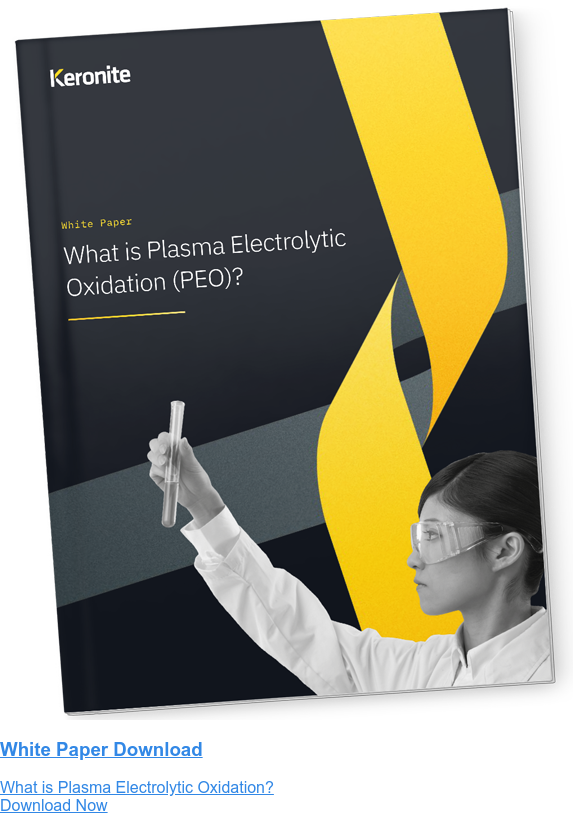Keronite for stronger tools and greener plastics
1 April 2020Manufacturers are seeing a strangely unsustainable side to recycled plastics: typically they contain abrasive particles that wear down moulding and forming equipment. Keronite is known as an exciting new ceramic coating technology providing improved wear resistance to a wide range of aluminium components. Now its scientists have found a way for its PEO technology to make recycled plastic even more sustainable: good news for manufacturers and the environment!
Recycled plastic destroys equipment
From supermarket salad bowls to kayaks, all sorts of plastics are shaped through a process called vacuum forming. A sheet of recycled thermoplastic, such as PET, is placed inside a moulding machine and heated. A vacuum is then applied to closely shape the plastic around the mould placed inside the machine. The plastic is cooled and the vacuum is turned off, resulting in a perfectly moulded plastic cast.
To make sure that the plastic can be removed, a lubricant is applied to the mould. The problems start as silica particles from the lubricant stick to the plastic. These can remain in the plastic after it is shredded and recycled. Unfortunately, these particles are abrasive even in very small quantities. Once attached, they continue to wear down moulding equipment faster than when virgin plastic is used.
Manufacturers have recognised that abrasive particles in recycled plastic place a limit on the material’s sustainability: the costs of having to periodically manufacture new moulds worn down by recycled plastic offset some of recycling’s economic and green credentials. Keronite set about investigating whether or not their resistant coating could limit the damage done by abrasive recycled plastics.
How the damage is done
When recycled plastic is remoulded, the remaining silica in the plastic damages moulding instruments. Replacing these instruments has a high economic and environmental cost: it can cost tens of thousands of pounds to machine a 40”x20” aluminium block into a mould tool, and the machining process leads to further carbon emissions.
To reduce wear of aluminium form tools, coatings such as hard anodising and nickel plating have been used to improve the wear resistance. These techniques have a limited lifespan: it is not always possible to recoat once they have been worn down, meaning a costly new tool must be created. Even when it is possible to recoat them, the tool must be first be stripped, costing time and money. Keronite coatings, on the other hand, offer remarkable life improvements over hard anodized tools— in some cases Keronite-coated tools last three times longer than hard anodized tools. A Keronite coated tool can be refurbished simply be re-immersing the tool in the Keronite process without stripping the coating first, adding further multiples to the tool life.
Laboratory refinements
The challenge for Keronite was to demonstrate that plasma electrolytic oxidation could be used to form a resistant but replaceable oxide layer on the specific aluminium alloys used to make vacuum forming tools. During PEO, variations in process parameters result in different layers on different metals and alloys. Thus Keronite is able to control the coating with great accuracy, making the most of the material structure of the aluminium alloy being coated.
It was left to Keronite’s in-house scientists to find the precise PEO parameters for an optimum replaceable coating. To protect against abrasive recycled plastic, tests were done on a range of 7xxx and 6xxx aluminium alloys commonly used by the plastic moulding industry. The performance of several Keronite coatings were compared with hard anodised and nickel plated alternatives.
After extensive wear testing, the process for forming a suitable PEO ceramic layer on the alloys was perfected. In parallel, Keronite removed a small area of coating, to simulate wear down to the bare metal and ran trials to recoat this area. This proved very successful. The nature of the process means that the uncoated area will heal itself before coating growth recommences uniformly over the rest of the part. In field trials, Keronite engineers found that this repair method could be repeated two or three times before the tool either needed stripping or replacing in full.
Keronite coatings can be up to four times harder than hard anodised coatings. Keronite has created a replaceable coating that drastically saves on the total life cycle cost of machines exposed to abrasive recycled plastic:
- Up to ten times the lifespan of conventional coating techniques
- Keronite coatings can be reapplied to prevent costly manufacture of new moulding tools
The benefits are not limited to vacuum forming. All mould tools and other plastic-handling machinery are victims of wear: Keronite’s precise PEO technique can now be considered for a wider range of customers.
Another industry takes up Keronite
Along with brake manufacturers and aerospace engineers, plastic moulding can now be added to the list of industries that are saving costs and increasing resistance thanks to Keronite. The versatility of the process is continually being tested and expanded, meaning more and more applications can benefit from the light weight, strength, and renewability of Keronite coatings. Get in touch to see how Keronite can increase the lifespan and lower the costs of your manufacturing components.

 Keronite is now part of the CWST engineered coatings business.
Keronite is now part of the CWST engineered coatings business.